Key takeaways
- Public forums foster genuine dialogue and trust between candidates and voters, emphasizing the importance of empathy and transparency.
- Sharing a clear and inspiring vision transforms campaigns into collaborative efforts, motivating both supporters and teams.
- Personal stories enhance connection and build trust, illustrating the real-world impact of policies while engaging audiences on an emotional level.
- Handling challenging questions thoughtfully can strengthen credibility, allowing for meaningful connections and deeper discussions about values and policies.
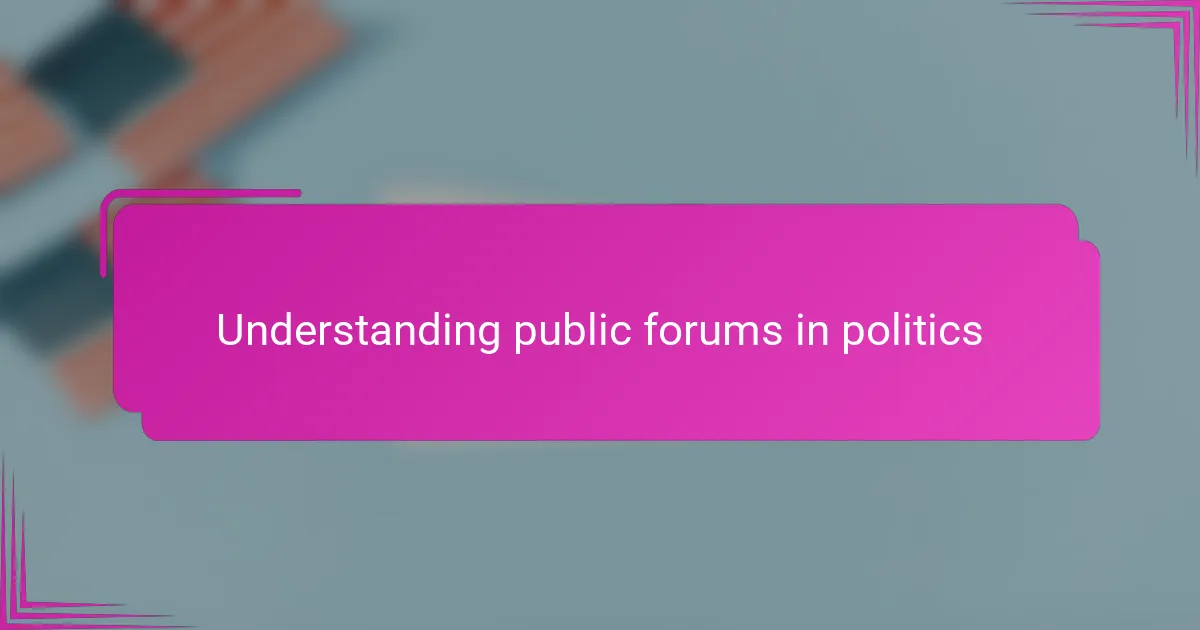
Understanding public forums in politics
Public forums in politics are more than just stages for speeches; they are dynamic spaces where ideas meet the public’s hopes and concerns. I remember stepping into my first town hall feeling a mix of excitement and nervousness, knowing this was my chance to truly connect beyond campaign ads. Have you ever wondered how these meetings shape the trust between a candidate and voters?
These forums allow for real-time dialogue, where listening becomes as important as speaking. It struck me how powerful it was to hear voices directly, to feel the energy in the room shift when shared values emerged. Public forums strip politics down to its human core—no scripts, just genuine conversation.
Understanding this is crucial for anyone involved in campaigns. When I embraced the unpredictable nature of these gatherings, I realized that success isn’t about perfect answers but about showing empathy and transparency. Isn’t that what democracy is all about?
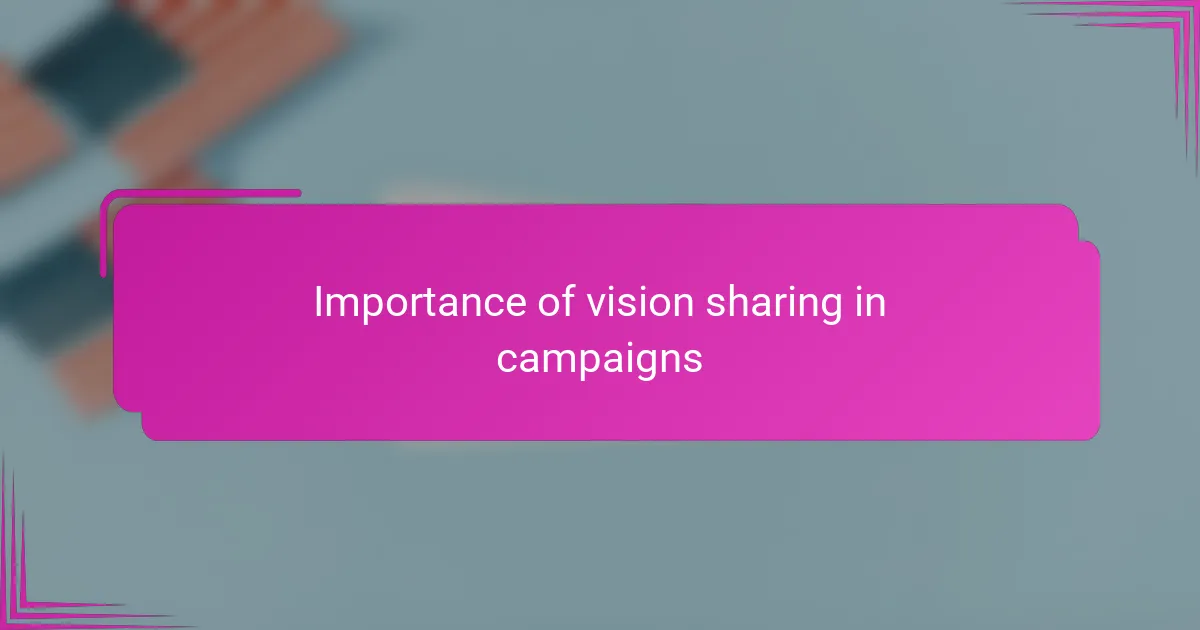
Importance of vision sharing in campaigns
Sharing your vision in a campaign isn’t just about outlining policies; it’s about painting a vivid picture of the future you want to build together. I found that when I clearly expressed what I hoped to achieve, people didn’t just hear words—they felt a connection to a cause bigger than themselves. Have you ever noticed how a compelling vision can turn passive listeners into active supporters?
In those moments, I realized vision sharing became the heart of trust-building. When voters understand where you’re headed, they can decide whether to join the journey. That transparency created a sense of partnership, transforming the campaign from a monologue into a shared mission.
It’s also a powerful motivator for the campaign team. When my vision was clear and inspiring, it fueled our collective energy and focus, even during tough debates or criticism. How could the campaign thrive without everyone believing in the destination as much as the candidate does?
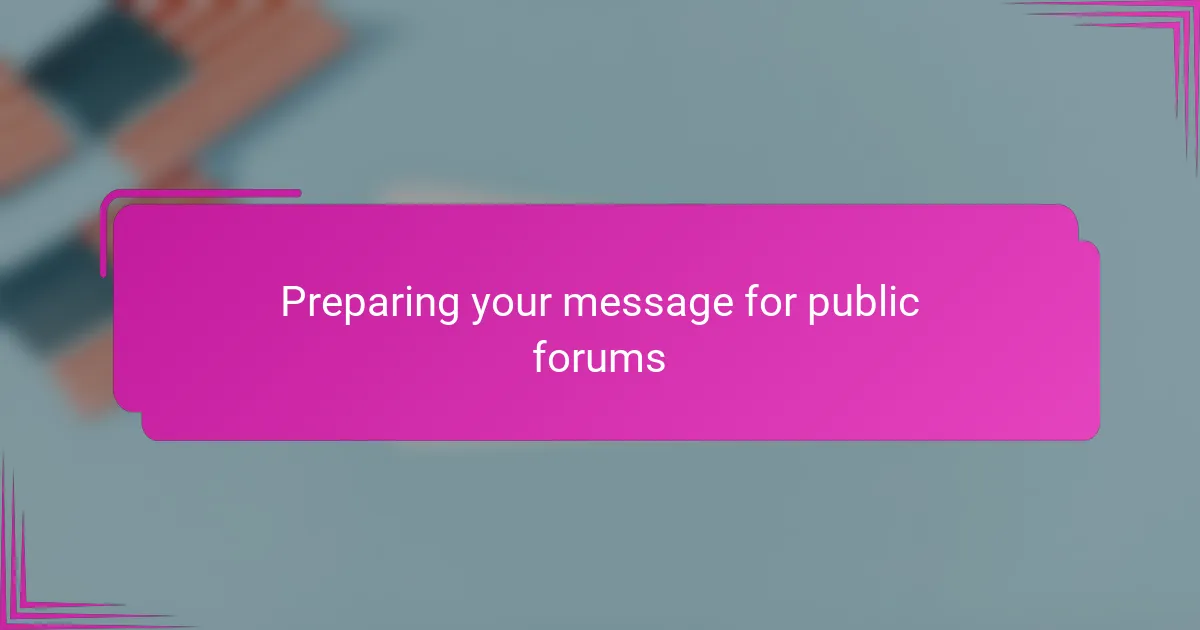
Preparing your message for public forums
Crafting your message before stepping into a public forum is like setting the foundation for a meaningful conversation. I always start by distilling my core vision into a few clear, relatable points—something voters can easily grasp and remember. Have you ever noticed how a cluttered message loses its power? That’s why simplicity became my best ally.
Next, I imagine the diverse audience I’ll face—different ages, concerns, and backgrounds. Preparing with their perspectives in mind helped me address not just issues, but emotions and values that resonate deeply. When I tuned into their world before the forum, I found my message carried more weight and sincerity.
Finally, I rehearse, but not just to memorize words. I practice speaking with conviction and warmth, because I learned quickly that how you say something matters as much as what you say. Have you ever felt someone’s passion light up a room? That’s the feeling I aim to create every time I share my vision.
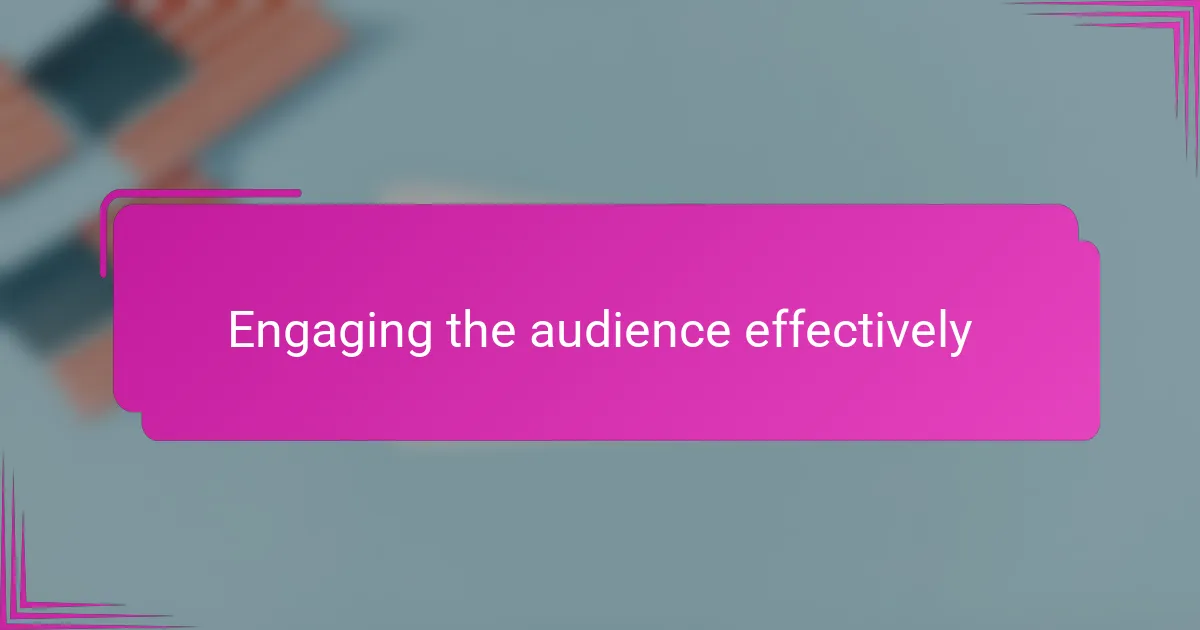
Engaging the audience effectively
Connecting with the audience goes beyond delivering a rehearsed speech; it’s about reading the room and responding to its energy. I remember one forum where a concerned mother’s question shifted the mood entirely—suddenly, my vision wasn’t just words, it became a shared hope. Have you ever experienced that moment when genuine interaction turns strangers into allies?
Keeping eye contact and inviting participation made all the difference for me. These small gestures told people I wasn’t just talking at them but inviting them into a conversation. Isn’t it amazing how a simple nod or a thoughtful pause can make your message feel personal and real?
What struck me most was that engagement is a two-way street. When I listened as much as I spoke, voters felt valued, and their feedback helped me sharpen my message. Have you noticed how people open up when they feel heard? That’s the kind of connection that fuels any successful campaign.
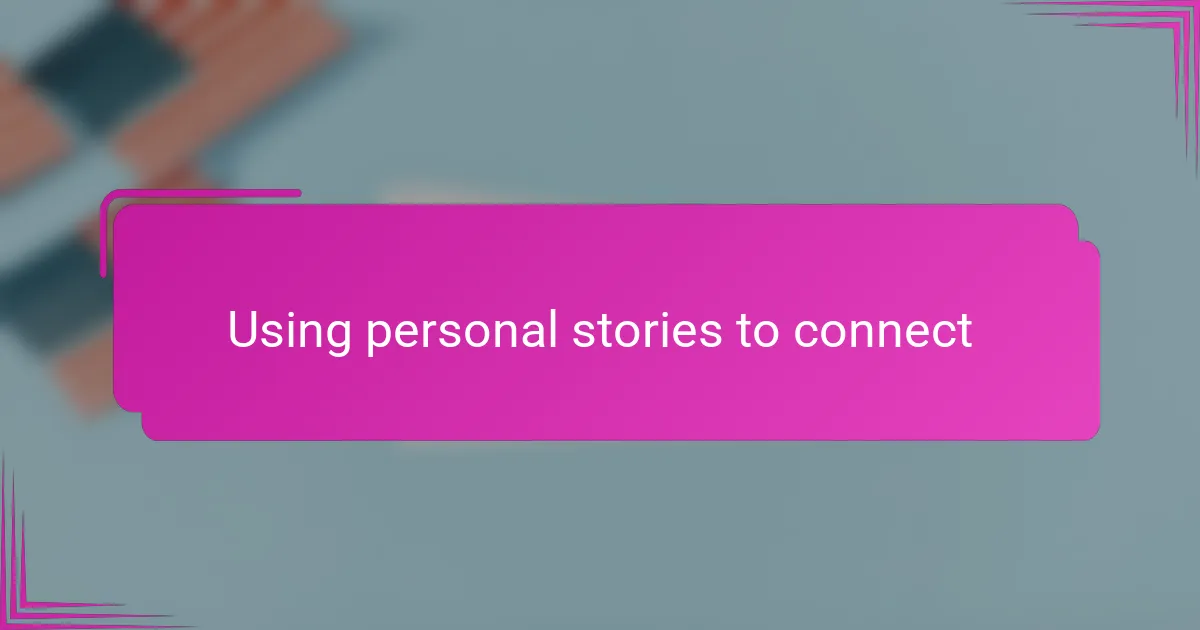
Using personal stories to connect
When I began sharing my vision during public forums, I found that weaving in personal stories made my message come alive. For example, recounting a family struggle with healthcare wasn’t just about policy—it showed voters the real-world impact behind my proposals. Have you ever felt how a sincere story can cut through the noise and truly resonate?
I noticed that these moments of vulnerability built bridges of trust. Audiences responded not just with applause but with nods and even tears, signaling they connected on a human level. It’s a powerful reminder that politics isn’t just data and dates—it’s about people’s lives and dreams.
Sometimes, after sharing a story, a voter would approach me with their own experiences, turning the forum into a two-way exchange. Those conversations deepened my understanding and fueled my commitment. Isn’t that the essence of authentic leadership?
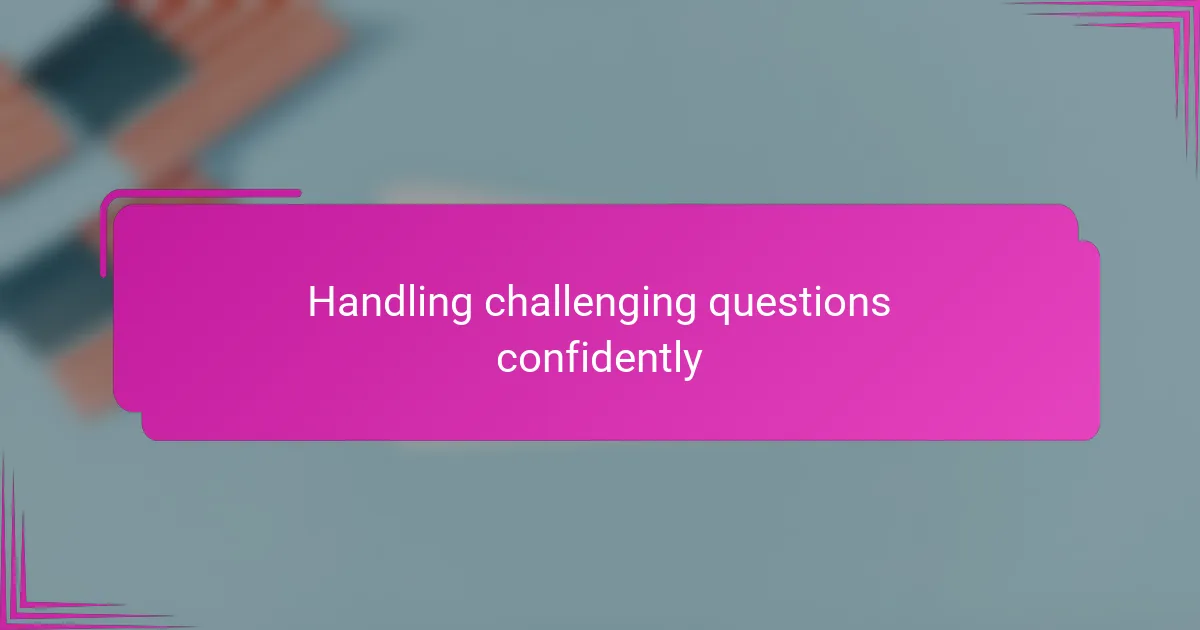
Handling challenging questions confidently
Handling challenging questions confidently took practice, but I learned that pausing to gather my thoughts was more powerful than rushing to answer. Have you ever felt your mind go blank under pressure? I found that taking a breath allowed me to respond with clarity and calm, which voters seemed to respect.
I also realized that acknowledging a question’s difficulty can build trust rather than weaken my position. Instead of deflecting tough topics, I confronted them honestly, turning potential setbacks into opportunities to explain my vision more deeply. When I did this, the audience’s skepticism often softened, and I could see the shift in their body language.
Facing tough questions pushed me to stay grounded in my values and prepared with facts, but more importantly, I learned to connect on a human level. Challenging moments became chances to show empathy and determination—qualities voters can’t help but notice. Isn’t that the real test of leadership under fire?
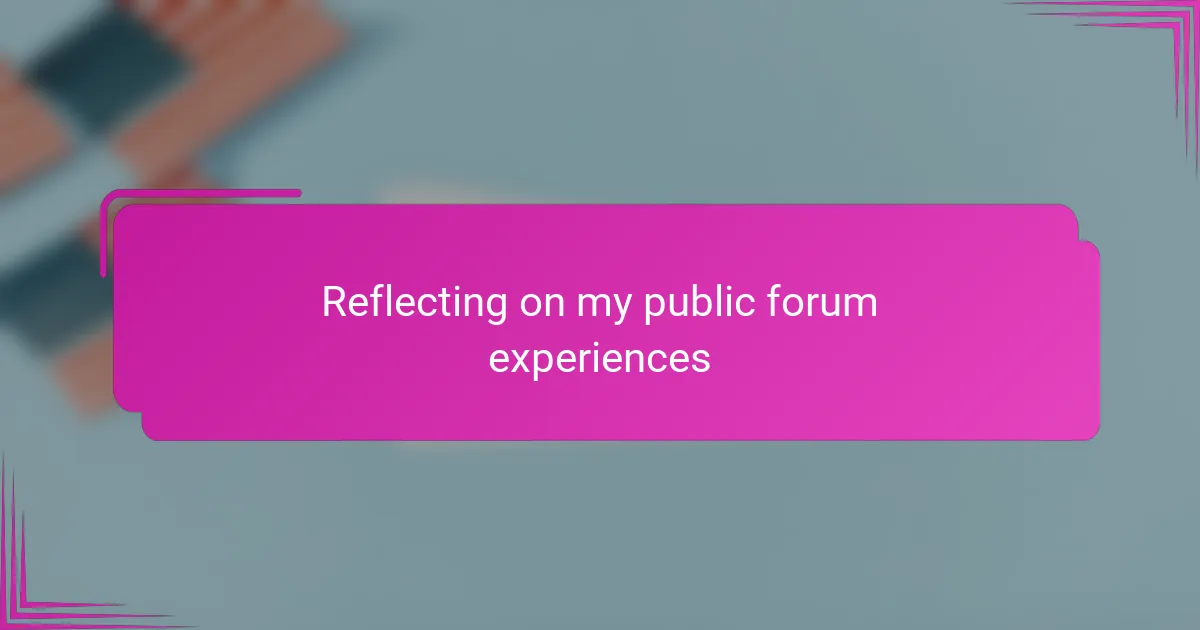
Reflecting on my public forum experiences
Reflecting on my public forum experiences, I realize how each event left a lasting impression on me—not just as a candidate, but as a listener and learner. There were moments when a voter’s heartfelt comment shifted my perspective entirely, reminding me that leadership isn’t about having all the answers but about staying open and connected. Have you ever had an experience that made you rethink your approach simply by tuning in more deeply?
Sometimes, after the crowd had dispersed, I found myself replaying conversations in my mind, analyzing what resonated and what fell flat. Those quieter moments helped me refine not just my message, but my mindset, teaching me patience and humility in ways no training session ever could. Isn’t it fascinating how real-time feedback can be both humbling and empowering?
Looking back, the unpredictability of public forums was what made them so transformative. Each audience brought new challenges and fresh hopes, and adapting to that taught me resilience and authenticity. I came to see that sharing a vision is less about delivering a perfected speech and more about inviting people into an ongoing conversation—one that we build together, step by step.